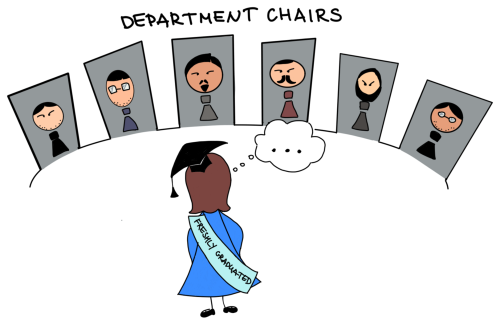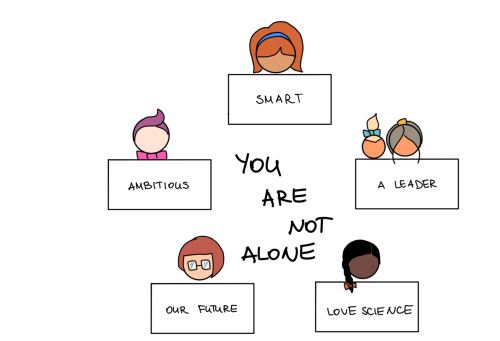You are not alone
Posted by Dina Mikimoto, on 2 June 2023
Gender problems in STEM are familiar to women researchers in every corner of the world. Japan is no exception. In a culture that seeks harmony and balance with people around, where conflict is avoided at all costs, it is often difficult to express someone’s needs. Social pressure is working in very subtle ways. You have an event in a room with photos of the previous heads of the department, twenty or thirty of them, which are all men; you go to a conference and see the overwhelming majority of the keynote speakers being male researchers; you notice the appointed leaders of the diversity and inclusion groups are mostly male when the volunteer groups have hardly any. The hours researchers stay in the laboratory make you feel like you are reliving the same day again and again; the boisterous communication style and jokes and comments are too harsh for you. The passion you once had for research is slowly withering away, leaving you with the feeling of unhappiness and unworthiness, and you give up, thinking that you are not made for this work, you are not a good fit, with a question in your mind: “How did I end up here?”.

I was lucky to grow up in a bubble where science was never gendered, there were no sciences that were inherently for women or men, and there were no subjects that some genders were naturally bad at. My parents were working in science-related areas, and they would divide school subjects between them. My mother would help me with mathematics, chemistry, and biology. My father with English, physics, and music. So, it never occurred to me that there was a need for societies supporting women researchers until I moved to Japan. My intrinsic belief that science is for everyone was challenged by a different culture, where many people of both genders believed otherwise for one reason or another. The confusion and frustration led me to research the problem (what else a scientist can do!?). And what I discovered – amazed me.
The universities in Europe and North America have women in STEM organisations active on social media, organising events, inviting young women scientists, actively connecting, and searching for opportunities to widen the network. These societies are vocal and visible, making the world know they exist. They constantly push for change. There are university-based workshops, training programs, and symposiums specifically for women in research. There is this feeling of women researchers trying to unite and support each other, pave the way for future generations, and improve the working environment.
I wished something like this existed in Japan. Most of the groups I found were quite exclusive: only for students, or mainly in Japanese, with no easily accessible information on how to join and what kind of events they are planning. There was little presence on social media, and you would need to make a targeted search to find them. I rarely hear about women researchers-oriented events or workshops, and yet to hear about women researcher-oriented training university programs.
So, I searched for women researchers’ communities outside the university and found ‘’Women in Science Japan’’, the young community founded by Elizabeth Oda, Dr. Sarah K. Abe and Lauren Hartz in 2019. I looked through their website and joined on the spot. I had a chance to talk with one of the co-founders, Elizabeth, and asked her about the motivation behind creating “Women in Science Japan”:
I and my co-founders created this community to address what we have witnessed as gender inequality in Japan, both the statistics you can often hear in the media and micro- and macroaggressions women experience. We also wanted to start with students and give a voice to students in high schools and universities. Because we knew both from the literature and from our own experience that in Japan, there are many negative stereotypes around women pursuing STEM and girls are discouraged from pursuing these fields from the young age.
Elizabeth says that one of the reasons most people join “Women in Science Japan”, and the one she thinks is very important for the future of the community and hopes to improve – is a mentorship program. That was one of my reasons for joining too. Even without talking about being an international researcher in a country that doesn’t speak your native language and has completely different social structures, finding your way in a field that wasn’t designed for you is difficult. I often feel that mentoring comes naturally to male researchers, whereas women researchers need it even more but receive it very rarely and are expected to figure out many things on their own. The community evolved, and apart from students, it started to focus more on early-career women. Elizabeth notes that it was important to create a space where members can be vulnerable, authentic, and empowered, without the fear of retribution, discipline or ostracisation, to feel heard and to have someone else say, “You are experiencing that too? I thought it was just me.”
The reality is that gender inequality is a systemic problem that an individual person can’t solve, so the idea was to create a culture that is more aware of the issues, willing to discuss the issues, face the issues, and hopefully raise these issues outside of the Women in Science Japan community.
Women in Science Japan now unites scientists, educators, women working in start-ups and the corporate world, and students at high schools and universities. Geology, biology, engineering, IT – all fields of science are welcome. And it is beautiful. It is invigorating to have such diversity, to be with people from all walks of life, with different backgrounds and different life stories. It is empowering and inspiring to hear what fellow members have overcome and where they are heading. It is not easy to be vulnerable and share your story, but if the person decides to do it – it is a treasure, a path for growth for both the person sharing and the person listening.
Women in Science Japan offers various activities: career-related events, mentorship mentioned earlier, casual events, and the book club (!). Elizabeth says that the book club is one of the things she is proud of. The book is chosen by members interested in joining the club and is related to gender inequality, science, and Japan. Currently, the book club is reading “How to Be an Inclusive Leader: Your Role in Creating Cultures of Belonging Where Everyone Can Thrive” by Jennifer Brown, which touches on diversity, equity, and inclusion. Being a part of the book club is a fantastic experience for me. The same text often generates different responses in different people, and this experience is the diversity in action. It is eye-opening to hear what people think and how the same words are heard differently because of the different backgrounds. Reading the book together, rather than alone, creates deep conversations, challenges to see the text from different angles and helps to navigate difficult questions.
I think we can only overcome our hardships and glass ceilings by holding each other’s hands and supporting and helping each other. This is one of the things Women in Science Japan is trying to achieve, a support system to help members to navigate complicated work situations or decisions, get feedback, provide clarity about career paths, and create a network that helps to build their businesses or solve work-related problems, or for international members to settle in Japan. And I wanted to use my chances to speak to the world and encourage women researchers to unite, to join communities like “Women in Science Japan”, to create new communities of like-minded people, say for women scientists in developmental biology or tissue engineering, or working on a specific problem. To be visible, vocal, advocate for your needs, become more confident, and create a welcoming future for the new generations of women in science. Or make a safe space for sharing your thoughts, finding your way, and knowing that you are not alone.

You are very welcome to join “Women in Science Japan” if you are currently working in science-related areas in Japan.
But if you are in countries other than Japan, here are some links that can get you started on your journey of finding a safe space. (Thank you to my fellow correspondents, The Node community manager, and my friends for helping me with this list.)
- A community for R coding women and non-binary: https://rladies.org/
- An Australia-based program: https://sciencegenderequity.org.au/
- European community for girls and non-binary kids: https://stemettes.org/
- A UK-based community: https://www.wisecampaign.org.uk/
- European community for mothers: https://www.mothersinscience.com/
- The ETH Society for Women in Natural Sciences: https://wins.ethz.ch/
- L’Oréal-UNESCO For Women in Science, the foundation that supports women in science: https://www.forwomeninscience.com/
- Global network for women in STEM: https://awis.org/
* Thank you to my friend Monica for the advice on illustrations.


 (4 votes)
(4 votes)